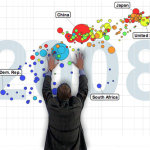 At the Integral Center Monday night Jeff set the tone by inviting us all to watch the video of the wonderful and well known Hans Rosling presentation “200 Countries, 200 Years, 4 Minutes” in which Hans demonstrates how 200 years of remarkable progress is closing the gap between the West and the rest.
At the Integral Center Monday night Jeff set the tone by inviting us all to watch the video of the wonderful and well known Hans Rosling presentation “200 Countries, 200 Years, 4 Minutes” in which Hans demonstrates how 200 years of remarkable progress is closing the gap between the West and the rest.
Below is the video of Monday evening and some highlights, which include the brain science behind our political leanings, an integral critique of postmodern art and the trajectory of the Catholic church. Feel free to skip ahead to what interests you…
15:30 Attendees share their impressions of the video with Jeff and talk about the challenge of dealing with the toxic fear that can be created when watching the news these days. Feeling into the vertical dimension (in all four quadrants) is an emergent intellectual property which allows us to be “reflexively loving” and genuinely curious, rather than critical and reactionary.
25:30 Jeff shares a provocative article from Politico dealing with the latest brain science behind the liberal and conservative orientations.
34:30 Jeff talks about the move from ideological to post-ideological, and the gifts of postmodernism. Mainly that it deconstructs dominator hierarchies that come before it.
41:00 Attendee Chuck points out that growth, from mountains to people, is dependent upon destruction. Easy to accept, until it isn’t.
“Why is it so painful? Why do we have kids suffering, and animals?” Jeff Asks. “I don’t want to say that’s okay. Fuck that. I’m going to be stuck wherever it is that that’s not okay.”
This is ultimately the paradox we embrace as integralists. He adds, “what you can trust is that what will happen is better than what is, and that’s counter to most of the reflexive human response, which is ‘oh my god here we go now, down the tubes.‘” In that mindset every new cultural development “is more evidence of the decadence and the ever-darkening dystopia that we’re heading towards.”
 49:30 Jeff talks about the dismal postmodern trend in popular culture and how the lack of a developmental perspective in films, and especially the recent Cloud Atlas, is so deeply disappointing (particularly because the directors, Andy and Lana Wachowski, are friends of Ken Wilber, and they know integral). “It’s good in certain ways but for me — I’m so angry at it — it just became a parade of plastic, prosthetic noses.”
49:30 Jeff talks about the dismal postmodern trend in popular culture and how the lack of a developmental perspective in films, and especially the recent Cloud Atlas, is so deeply disappointing (particularly because the directors, Andy and Lana Wachowski, are friends of Ken Wilber, and they know integral). “It’s good in certain ways but for me — I’m so angry at it — it just became a parade of plastic, prosthetic noses.”
(He did enjoy Life of Pi, however. “Beautiful…transcendent…”)
52:00 Conversation focuses on the arrow of evolution. (It’s agreed that losing is still ugly no matter how far you move up through the stages.)
One of the main shadows of 2nd tier consciousness is falling in love with ideas (the map) and dismissing the disasters and dignities of 1st tier stages with academic detachment, which is why it’s important to have integrated, healthy green online.
Jeff points out that green “is the dawning of psychology, the dawning of a lot of the human potential work, seeing each other. Feelings become paramount and the pain of another person becomes paramount. Thank God…and as Clare Graves said, unless you fully take green on you’re not worthy of integral, because you’re just going to be sort of a cyclops…something is going to be missing.”
We want to penetrate what’s really happening in a way where we can be actually helpful, and the insights of green are crucial.
57:00 The conversation turns to the economy (sequestration) and it’s relationship to suffering. Sweden and Denmark are modeling highly advanced, egalitarian societies, while Africa is coming online with so much potential but so much suffering. Holding both of these is an integral practice.
Jennifer, a regular guest, suggests that we need to have had some spiritual experience of non-duality — a first hand experience of the place where everything really is okay — in order to do this. Jeff relates this to his chaplain training, being radically present to what is.
1:10:00 The group goes on to talk more about non-duality, compassion, the Pope and the Catholic church, along with the general trajectory of Christianity in the modern world.
Our friend John raises the idea of spiritual bypassing as perhaps the most insidious shadow of integral — not really embodying our basic human emotions, including our connectedness, whether it be to an imperiled planet or to a hungry child.
He reminds us of something Tom Atlee said. “Things are getting better and better and worse and worse, faster and faster.”
– Written by Brett Walker






The article from Politico was very interesting, thanks for bringing it to my attention.
I also want to comment on this:
“Sweden and Denmark are modeling highly advanced, egalitarian societies”
I hear this a lot from the US. I would say that some of it is true, and some of it is a golden projection.
Basically, we’ve handled some of the significant areas where the US is struggling. But Sweden is struggling in other areas, such as actual freedom of speech and political diversity. You can be ostracized here for having political opinions that would be quite mainstream in the US or the UK. IMO, this is a high price to pay for enabling the kind of consensus and compromise that are the foundation of Swedish society.
Another factor that is often overlooked is that Denmark has the highest ratio of private debt in the world (!) with Sweden doing what it can to catch up.
Finally, Sweden has balanced its budget by eroding the welfare system (health care, especially) and spending less money on infrastructure. Not exactly what one would expect from a Scandinavian country.
Great discussion. Whenever I see or hear one of these talks I always learn some new perspective I didn’t think of before. I like that the idea of seeing liberals and conservatives as different personality types is filtering into news articles and the general culture. I think this is a good development, possibly even the beginning of integral ideas. Ken talks about making the subject object. You transcend a stage when you make it an object, no longer identifying with it as the subject.
So maybe we are starting to see people transcend “liberal”, “left”, “conservative”, “right”, etc as subjects, as identities you cannot see beyond. And recognizing that they come from different interiors. This loosens the hold that any particular identity has on us, allowing us to include both. Maybe in the future we won’t be holding these identities so strongly, but seeing them as tools and perspectives we can use.